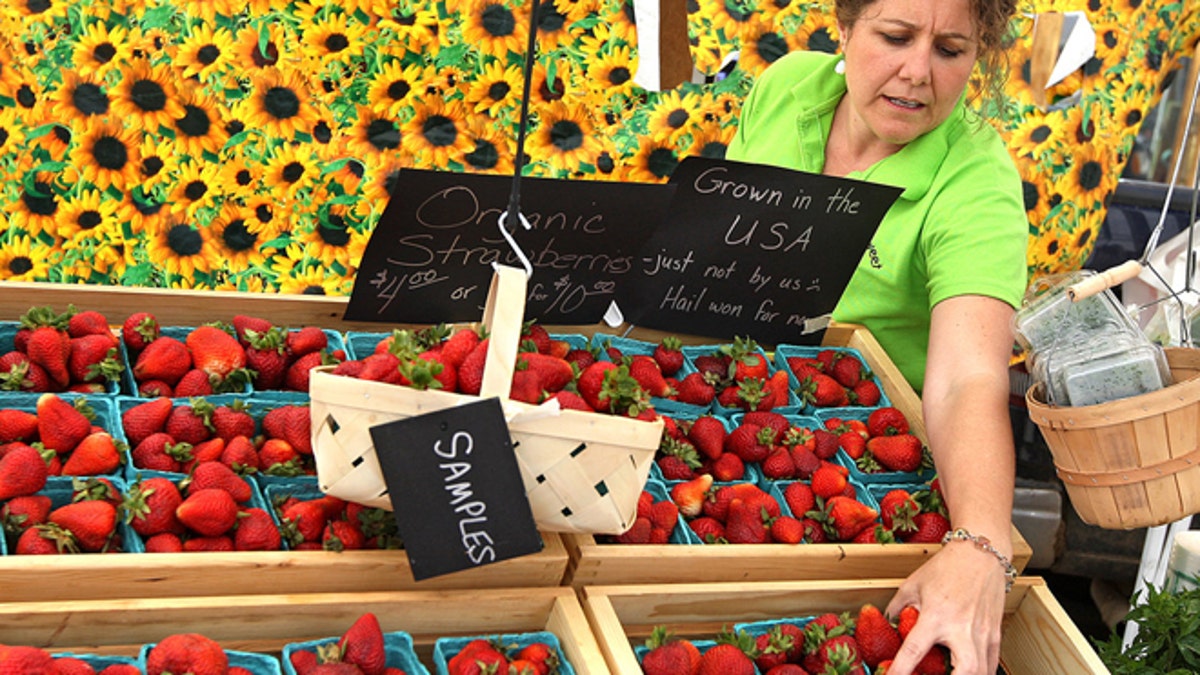
FILE -- Lisa Steketee restocks strawberries during the Laramie Farmers Market in Wyoming. ((AP/Ben Woloszyn))
There’s something growing at your local farmers market. Of course there are plenty of farm fresh foods from which to choose, but what might be most surprising is the growing popularity of markets across the country.
In 1994, only 1,700 farmers markets existed in the United States. But in 20 years, the USDA National Farmers Market directory now lists more than 8,100 markets.
In honor of the 15th Annual National Farmers Market Week being held Aug. 3-9, here are five reasons to ditch the supermarket checkout line and see what crops are being harvested in the fields you pass every day.
[pullquote]
1. You Get to Know Your Food Producers. There’s no question that supermarkets are convenient. Shoppers can pick up whatever items are on their list in just one or two stops. But you’ll never develop a relationship with a self-checkout kiosk no matter how hard you try.
Consumers today want to know more about where their food came from. What better source to answer questions than the men and women who cultivated the produce from a seed? Being able to look a farmer in the eye to hear about the growing process is a great way to trust your food source and ensure a safe meal for your family.
2. You Eat Better. There’s an obvious difference in taste between freshly harvested fruits, vegetables, meats and grains and their packaged, processed and preserved counterparts. In case you’re not convinced, many vendors give out free samples. It’s like Sam’s Club, only much better.
Beyond better taste, shopping at farmers markets for raw ingredients allows you to know exactly what is going into your meals and keep a well-balanced diet.
3. It's a Source of Entertainment. Many farmers markets today are not your grandfather’s farmers markets. There’s a certain social aspect to the farmers markets that makes it a community where you’re sure to see some familiar faces every week.
With more and more farmers markets becoming a home for live music, arts and crafts, grocery shopping doesn’t have to be such a bland experience anymore. Instead, it’s like a miniature festival that comes to town every week, and there’s no cover charge to get in.
4. You are Supporting Your Local Economy. The agricultural market today reacts on a national and international scale and has clearly become big business for the largest commercial farms. But the small-town American farmer is still alive and well and that is thanks in large part to farmers markets providing an outlet for local growers to sell their goods.
It’s not just farmers who benefit though. Some cities choose to host farmers markets in specific business districts to help drive foot traffic to the brick and mortar stores as well. It’s a win for both the visitors and the hosts.
5. Farmers' Markets are a Teaching Tool. It’s not always easy finding activities for kids who are out of school all summer long. Luckily, the growing season overlaps quite a bit and farmers markets are great locations for kids to learn about where their food comes from. Kids are naturally curious and will ask all kinds of questions that help them understand the benefits of the food chain and how food ends up on their plate every day. Kids also get a sense of accomplishment when they pick out the food themselves and help with the preparation. The bonding that occurs initially at the market continues into the kitchen at home.
With busy schedules, it’s easy to get stuck in the drive-thru diet. And if it’s been awhile since your last home-cooked meal, many vendors also have cooking demonstrations and recipes for some of their favorite meals. It’s a valuable learning experience for child and parent alike.
Farmers markets will in no way replace the typical grocery store. They provide access to foods year-round that might otherwise be only in season for a few months.
But we should certainly take advantage of the local-grown goods while they’re available and thank the growers while we have the chance. We would all go hungry without them.








































